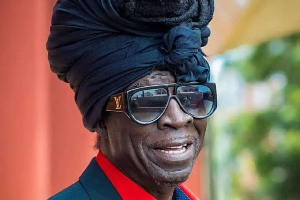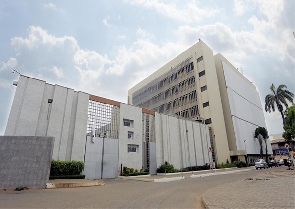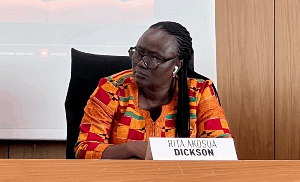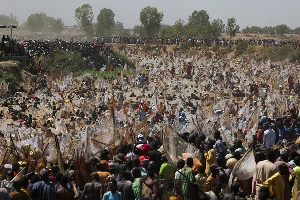Central banks in some of sub-Saharan Africa’s biggest economies may be more concerned about the impact of a potential third wave of coronavirus infections and a slow rollout of vaccines than quickening inflation, leaving borrowing costs unchanged for now.
Monetary policy committees in Ghana, Nigeria, South Africa, Kenya and Angola are unlikely to follow those in Brazil, Turkey, Mozambique, Zambia and Zimbabwe just yet when they announce their decisions on interest rates in the next eight days.
Inflation in the continent’s two biggest oil producers, Nigeria and Angola, is in double digits and rising, and the currencies remain under pressure.
However, the risks to the recovery of most economies in the region after the worst slump in half a century last year, remain elevated.
After some African central banks cut to record lows in 2020, most have reached the limit on monetary policy easing and an extended pause in key rates seems likely in countries where there is less severe pressure on exchange rates, according to Razia Khan, chief economist for Africa and the Middle East at Standard Chartered Bank.
The region’s policy makers may also take comfort from an accommodative global monetary policy environment, with the Federal Reserve signaling that U.S. interest rates will remain near zero through 2023.
Lower-for-longer global interest rates mean African central banks won’t be forced to tighten policy in a bid to keep local assets attractive to offshore investors.
Here’s what central bankers in sub-Saharan Africa may do:
Ghana, March 22
Policy rate: 14.5%
Inflation rate: 10.3% (February)
Inflation target: 8% +/- 2
Ghana’s MPC is expected to hold its benchmark rate for a sixth meeting as it assesses how new tax measures announced this month and higher utility costs affect inflation that’s been above the target range for most of the past year.
The policy rate will likely be maintained to help drive the country’s economic-growth agenda, said Agyapomaa Gyeke-Dako, a senior lecturer in economics at the University of Ghana Business School.
West Africa’s second-largest economy slipped into a recession last year and could recover to expand 5% in 2021, according to government estimates.
Weak demand growth, an appreciating currency and the prospect of lower inflation mean the central bank may have room to ease further in the third quarter, Societe Generale said in a note this month.
Nigeria, March 23
Policy rate: 11.5%
Inflation rate: 17.3% (February)
Inflation target: 6% - 9%
Nigeria’s MPC will probably leave its key rate unchanged even with inflation at a four-year high, as it tries to prop up an economy that emerged from a recession in the fourth quarter and where a third of the labor force is unemployed.
While the central bank will keep monitoring inflation, accommodative policy is key to accelerate the recovery, Governor Godwin Emefiele said in speech last month.
The government’s U-turn on planned hikes in fuel prices could give the MPC room to keep focusing on stimulating economic growth.
Unless President Muhammadu Buhari’s administration decides to liberalize gasoline and power tariffs, rate hikes may be unlikely this year, said Mohamed Abu Basha, head of macroeconomic analysis at EFG Hermes Holdings.
South Africa, March 25
Repurchase rate: 3.5%
Inflation rate: 3.2% (January)
Inflation target: 3% - 6%
South Africa's break-even rate shows traders see inflation quickening
South Africa’s central bank will likely hold the key rate for a fourth meeting even as fuel and electricity price increases due in April are set to push inflation closer to the midpoint of its target range.
Concerns about inflation will probably mean the five-member panel will vote unanimously for an unchanged stance, after their preferences were split between cutting and holding at the last three meetings, Elize Kruger, an independent economist, said.
All 15 analysts in a Bloomberg survey expect the MPC to hold the benchmark at a record low and forward-rate agreements, used to speculate on borrowing costs, are pricing in a less than 45% chance of a 25 basis-point hike.
The MPC could take advantage of the accommodative global environment to “maximize the stimulation that they can give the economy via low interest rates,” Kruger said.
The panel is likely to remain tolerant of negative real rates for as long as the rand is relatively stable and will be wary to tighten pre-emptively amid recessionary conditions, she said.
Kenya, March 29
Central bank rate: 7%
Inflation rate: 5.8% (February)
Inflation target: 5% +/- 2.5
Kenya's central bank may hold its key rate even as inflation ticks up.
The MPC in East Africa’s biggest economy is expected to keep its benchmark rate steady for a seventh meeting in a row amid fears of a third wave of Covid-19 infections.
While inflation at a 10-month high is a concern, it’s unlikely to result in an immediate increase in the key rate, said Renaldo D’Souza, head of research at Nairobi-based Sterling Capital. The policy stance will be guided by macroeconomic conditions and the impact of virus-control measures, he said.
Angola, March 29
BNA rate: 15.5%
Inflation rate: 26.39% (Luanda, February)
2021 Inflation target: 18.7%
Angolan policy makers are likely to hold the key rate even as the country contends with inflation at a three-year high. That’s because a lot of the price pressures are seen as imported and the pass-through from the central bank rate to inflation and consumer demand in Africa’s second-biggest oil producer is weak.
Instead of using monetary policy, the central bank attempts to temper price growth by adjusting the amount of kwanza in circulation and keeps that in line with inflation targets.
Maintaining the key rate gives ongoing and new credit operations granted by commercial banks a higher chance of success, Governor Jose de Lima Massano said after the central bank kept the benchmark unchanged in January.
Business News of Sunday, 21 March 2021
Source: bloomberg.com
Key African Central banks aren’t rushing to raise interest rates
Entertainment












